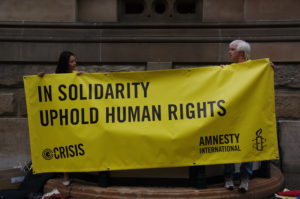Edward Snowden Says NSA Spied on Amnesty International and Other Human Rights Groups
Former NSA contractor-turned-whistle-blower Edward Snowden made a virtual visit to a Council of Europe summit in Strasbourg, France, on Tuesday to claim that the American security agency had spied on human rights organizations, including Amnesty International. Shutterstock
Shutterstock
Former NSA contractor-turned-whistle-blower Edward Snowden made a virtual visit to a Council of Europe summit in Strasbourg, France, on Tuesday to claim that the American security agency had spied on human rights organizations, including Amnesty International.
Snowden piped in via video link from Moscow to tell the assembly of human rights monitors about the NSA’s snooping on various groups — both abroad and domestic — including some technological details, The Guardian reported that day:
He told council members: “The NSA has specifically targeted either leaders or staff members in a number of civil and non-governmental organisations … including domestically within the borders of the United States.” Snowden did not reveal which groups the NSA had bugged.
The assembly asked Snowden if the US spied on the “highly sensitive and confidential communications” of major rights bodies such as Amnesty and Human Rights Watch, as well as on similar smaller regional and national groups. He replied: “The answer is, without question, yes. Absolutely.”
In live testimony, Snowden also gave a forensic account of how the NSA’s powerful surveillance programs violate the EU’s privacy laws. He said programs such as XKeyscore, revealed by the Guardian last July, use sophisticated data mining techniques to screen “trillions” of private communications.
“This technology represents the most significant new threat to civil liberties in modern times,” he declared.
XKeyscore allows analysts to search with no prior authorisation through vast databases containing emails, online chats, and the browsing histories of millions of individuals.
Snowden said on Tuesday that he and other analysts were able to use the tool to select an individual’s metadata and content “without judicial approval or prior review”.
During his appearance before the Council of Europe, Snowden emphasized that he has “no intention to harm the U.S. government” or its relationships with other countries — and while he was at it, he also recommended that his audience encrypt their personal messages.
–Posted by Kasia Anderson
Your support matters…Independent journalism is under threat and overshadowed by heavily funded mainstream media.
You can help level the playing field. Become a member.
Your tax-deductible contribution keeps us digging beneath the headlines to give you thought-provoking, investigative reporting and analysis that unearths what's really happening- without compromise.
Give today to support our courageous, independent journalists.






You need to be a supporter to comment.
There are currently no responses to this article.
Be the first to respond.